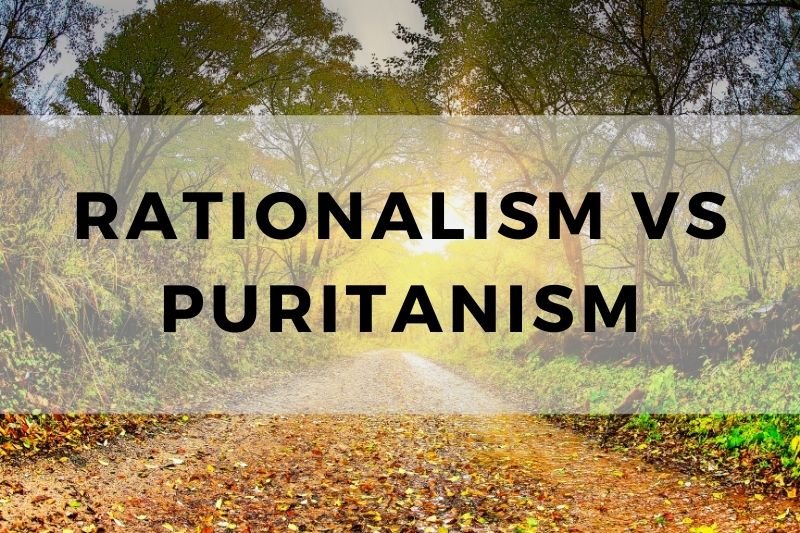
Rationalism and Puritanism represent two distinct ways of thinking. Rationalism prioritizes reason, logic, and intellectual clarity. Puritanism, on the other hand, focuses on strict religious beliefs and moral conduct. These two philosophies often clash, as they offer differing views on human nature, knowledge, and the purpose of life.
Throughout history, this conflict has shaped cultural, political, and social movements. In this article, we will explore the key differences between Rationalism and Puritanism, and examine how these two systems of thought have influenced each other.
Defining Rationalism
Rationalism is a philosophy that emphasizes reason as the primary source of knowledge. It asserts that reality can be understood through logical thought, independent of sensory experience. Rationalists believe that some truths are innate and can be discovered through intellectual reasoning. Thinkers like René Descartes and Spinoza championed this view. They argued that reason, not experience, is the foundation of understanding. Rationalism values certainty and clarity, rejecting beliefs based on faith or sensory perception alone. This philosophy has had a profound influence on science, mathematics, and modern thought.
Understanding Puritanism
Puritanism is a religious and moral philosophy that emerged in the 16th and 17th centuries. It focuses on strict adherence to Christian doctrine and moral purity. Puritans believe that life should be lived in accordance with Biblical teachings. They emphasize self-discipline, hard work, and personal responsibility. Puritanism rejects indulgence in worldly pleasures and stresses the importance of living a righteous life. The movement played a significant role in shaping early American culture, particularly in the New England colonies. Puritans prioritized community, faith, and a rigid moral code in all aspects of life.
Key Differences Between Rationalism and Puritanism
#1. Approach to Knowledge
Rationalism holds that reason is the key to knowledge. Rationalists argue that human beings can understand the world through logical thought and intellectual analysis. They believe knowledge is primarily attained through the mind, not through experience or emotion. Puritanism, however, places more emphasis on spiritual and religious knowledge. For Puritans, understanding is grounded in faith, Biblical teachings, and the divine will. They reject knowledge that is not rooted in scripture or God’s guidance, seeing it as potentially misleading.
#2. Role of Faith
For Rationalism, faith is not a reliable source of knowledge. Rationalists view belief systems rooted in faith as subjective and unprovable. They argue that only what can be reasoned and logically verified is worth trusting. In contrast, faith is central to Puritanism. Puritans believe that true knowledge and moral guidance come directly from God, and that a devout, faithful life leads to salvation. Faith in God’s will and the teachings of scripture are the foundation for understanding life and making decisions.
#3. View on Human Nature
Rationalists generally see human beings as capable of reason and self-improvement. They hold that humans are naturally inclined to use their intellect to solve problems and better understand the world. Rationalism is based on the idea that humans can transcend their flaws through the power of reason. Puritans, however, view human nature more negatively. They believe that humans are inherently sinful and require God’s grace for salvation. Puritans see human impulses as corrupt and dangerous, needing strict moral discipline and divine intervention to be controlled.
#4. Attitude Toward the World
Rationalists believe the world is a place to be studied and understood. They focus on empirical evidence and reason as ways to improve human life and shape the future. The physical world is not something to be feared or avoided but a domain to be explored and mastered through knowledge. Puritans, however, view the world with suspicion. For them, the world is full of temptation and distraction from spiritual purity. They see life as a test, where the primary focus should be on adhering to religious values, avoiding worldly pleasures, and preparing for the afterlife.
#5. Influence of Religion
Religion is a cornerstone of Puritanism. It governs all aspects of life and is seen as the highest moral authority. Puritans believe every action must be evaluated through the lens of religious doctrine, and they reject any form of knowledge or behavior that contradicts their faith. In Rationalism, religion is often sidelined. Rationalists typically challenge religious dogma and prioritize human intellect and reason as the foundation of knowledge and understanding. Rationalism frequently criticizes traditional religious beliefs as unscientific or overly reliant on authority rather than reason.
#6. Emphasis on Reason
Rationalism places reason above all else. It holds that logical thinking and systematic inquiry are the only reliable ways to discover truth. The mind is seen as the ultimate tool for understanding reality. Rationalism values clarity, objectivity, and precision in thought. Puritanism, in contrast, emphasizes obedience to religious laws and the submission of the intellect to divine will. While rational thought may be respected, it is never considered more important than piety and the moral teachings of scripture. In Puritanism, reason serves to interpret God’s will, not to stand in judgment of it.
#7. Moral Authority
Moral authority in Rationalism comes from the ability to reason and discern right from wrong through logical processes. Rationalists believe that morality is a human construct and can be understood through reason, not divine command. They often argue that moral systems should be based on universal principles of justice and fairness, derived from human experience and reason. In Puritanism, moral authority is derived solely from God’s will, as expressed through scripture and religious leaders. Puritans believe that moral laws are divine and unchangeable, and that only adherence to these laws ensures righteousness.
#8. Social Impact
Rationalism has significantly influenced fields such as science, politics, and education. Its emphasis on reason led to the scientific revolution, the Enlightenment, and modern democratic principles. Rationalism contributed to a shift away from religious authority in governance, advocating for secularism and individual rights. Puritanism, while also shaping society, had a more restrictive influence. Its focus on moral purity and religious conformity played a key role in the founding of early American colonies, especially New England. Puritans set up communities that were governed by strict religious rules, influencing the development of laws and cultural values that emphasized piety, work ethic, and social discipline.
#9. View on Pleasure
Rationalism is more accepting of pleasure, as long as it is consistent with reason. Rationalists argue that enjoying life and pursuing personal happiness is compatible with a rational understanding of the world. They believe pleasure can be a natural result of achieving intellectual or moral goals. Puritans, however, reject the pursuit of pleasure for its own sake. They view indulgence in earthly pleasures as sinful and distracting from the pursuit of holiness. For Puritans, self-denial and asceticism are central virtues, as they believe worldly pleasures can lead people away from spiritual salvation.
#10. Legacy
Rationalism’s legacy is vast and visible in many modern institutions and intellectual movements. It is the foundation of much of contemporary science, philosophy, and political thought. Rationalist ideas contributed to the growth of secularism, the spread of human rights, and the rise of scientific methodologies. Puritanism’s legacy, while more culturally specific, also had significant influence, particularly in the United States. The Puritan work ethic, moral discipline, and focus on individual responsibility have shaped American society. The values of piety, self-control, and community governance continue to echo in many aspects of Western life today.
Rationalism Vs Puritanism: A Conflict Over Time
The Enlightenment Era
During the Enlightenment, Rationalism gained momentum as thinkers challenged traditional religious and political authorities. The movement advocated for the supremacy of reason, science, and individual rights. Rationalists, such as Voltaire and John Locke, sought to replace the religious dogmas of the past with rational inquiry. In contrast, Puritans, though not central to the Enlightenment, still represented the old religious order that emphasized submission to divine authority. The Enlightenment era marked a period of increasing tension between those who embraced reason and those who remained committed to religious faith.
Colonial America
In colonial America, the clash between Rationalism and Puritanism was particularly evident. The Puritans who settled in New England sought to create a society based on religious principles. They imposed strict moral codes and governance systems aligned with their religious beliefs. However, as Enlightenment ideas spread, these Puritan communities faced challenges. Rationalism’s emphasis on reason, science, and individual freedom slowly undermined the Puritan emphasis on religious conformity. The shift towards secularism and a more scientific view of the world created a fundamental conflict between the two ideologies.
Political and Social Movements
Rationalism and Puritanism also clashed in political and social movements throughout history. The Puritanical influence on early American laws created a moral framework that often clashed with emerging rationalist ideas. For example, debates over issues like slavery, women’s rights, and freedom of expression revealed deep divides between those who believed in divine moral authority and those who argued that reason and logic should guide societal progress. As Rationalism became more prevalent, many of the strict moral codes of Puritanism were challenged, leading to social reforms.
Modern Times
Even in modern times, the conflict between Rationalism and Puritanism is still relevant. Rationalism has driven advancements in technology, science, and civil rights, often challenging religious orthodoxy. Puritanical values, though less dominant, continue to influence political and cultural debates, especially in matters of morality, law, and personal behavior. The ongoing tension between these two worldviews shapes many aspects of modern society, from education to legislation to social norms.
Closing Thoughts
The conflict between Rationalism and Puritanism highlights the tension between reason and faith, intellectual freedom and moral discipline. While Rationalism has driven progress in science and society, Puritanism has left a lasting impact on cultural and moral values. Both philosophies offer valuable insights, yet their opposing views have led to ongoing debates throughout history.
Understanding this conflict is essential for understanding the evolution of Western thought and the balancing act between reason and religion. As modern society continues to navigate these tensions, the influence of both Rationalism and Puritanism will remain significant in shaping our future.
